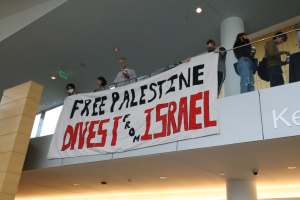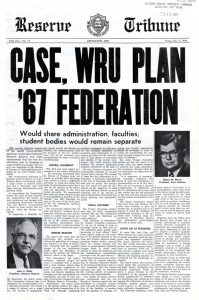Adler and Pomerantz: Isaeli-Latino cook-off was a savory success
To the editor,
I am writing to you to bring to light some important aspects of change evident on campus. The Case Western Reserve University’s mission statement reads, “CWRU improves and enriches people’s lives through … promotion of an inclusive culture of global citizenship.” As a student attending this university, I feel it is integral to abide by that statement every day. In order to foster an environment in which everyone feels welcome to experience an array of cultures, awareness of this mission must be made a top priority around campus.
There are many differences between diversity and pluralism. Although we may have a diverse campus due to the workings of the admissions office, having a pluralistic campus relies on us, on the students. Key aspects of pluralism include being able to remain comfortable in one’s own beliefs while accepting differences in others and being able to engage in conversations about these differences with one another. Building bridges between student groups is one great way to promote such an open environment.
The Office of Multicultural Affairs, the Office of Education Abroad and many more offices on campus have done a wonderful job paving the way for change. With programs like Diversity 360 and Sustained Dialogue, students have an outlet through which they are able to learn positive methods of communication and behavior when reaching out to groups with which they may not be familiar.
One student program that stands out this semester is the Israeli-Latino Cook-off. The concept of this event brings together two seemingly unrelated cultures through food, music and conversation. Food, especially when it’s free, is an incredibly effective way to get college students together. The two groups planned the event to ensure that students who attended were able to appreciate each other’s cultures. The leaders of the program prepared well-known recipes from each culture for the students to cook while listening to music from both cultures. The sit-down dinner was an opportunity for students to converse with one another about the similarities and differences they had found.
The students took the event and ran with it. The food was delicious and everyone involved felt that the experience was rewarding. They learned about vegetables and spices from each culture that give insight into the rich history of the dishes themselves. Allowing students to be proud of their cultural roots and giving them the space to share with others is one of the best ways to open the dialogue and connect cultures around campus.
Each individual carries a story, a history and a culture that should be shared and appreciated for the richness it brings to our campus. The more “Israeli-Latino Cook-offs” we have, the more successful we will be in our fight for a pluralistic campus. In order to sustain and expand this environment at CWRU, it is imperative that these initiatives come from the student-body. I cannot wait to see what they bring forth.
Talia Adler
Israel on Campus Coalition, second-year student
Hannah Pomerantz
First-year student









